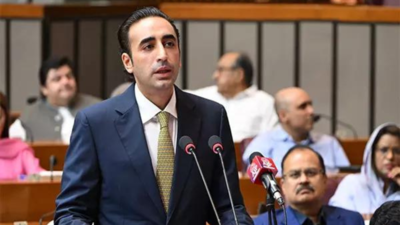
NEW DELHI: Bilawal Bhutto-Zardari on Wednesday said that Pakistan was ready to "cooperate" with India to combat terrorism further seeking a "dispute resolution mechanism" between the two nations.
Asking for a combined effort between the intelligence agencies of the two nations- RAW and ISI- Bhutto warned that continued conflict only empowered non-state actors."Pakistan would still like to cooperate with India to combat terrorism. We can't leave the fate of 1.5 billion, 1.7 billion people in the hands of non-state actors and terrorists. For them to decide, at a whim, that (when these) two nuclear-armed powers will go to war," Bhutto said speaking at a UN briefing in New York"You can't have no dispute resolution mechanisms between two nuclear-armed countries.
I am completely confident that if ISI and RAW were ready to sit down and work together to fight these forces, we would see a significant decrease in terrorism in both India and Pakistan," he added.Pakistan's delegation led by Bhutto is in the US at the same day as Shashi Tharoor-led delegation. Commenting on this, Tharoor remarked that the presence of both delegations would heighten "interest", as the United States—whose president has often taken credit for the India-Pakistan ceasefire—would hear two starkly contrasting perspectives on the same day.
"In Washington, we'll have the interesting phenomenon of the Pakistani delegation in America, and almost exactly the same days... Tomorrow almost they will be in Washington, while we are in Washington on the same date. So there's going to be perhaps an increase in interest because there are two duelling delegations in the same city," Tharoor told ANI on Tuesday.The delegation has arrived in the States. "An all-party delegation led by Shashi Tharoor arrives in Washington DC Over the next two days the delegation will be meeting members of the US Congress and administration, think tanks, media and policymakers to brief them on Operation Sindoor and India's strong stand against terrorism," Indian Embassy in US said.Meanwhile, Pakistan reportedly suffered significant losses after attempting to strike military and civilian targets in response to Operation Sindoor. Preliminary assessments indicate that the Indian Air Force inflicted heavy damage, destroying six Pakistan Air Force fighter jets, two high-value aircraft, over 10 unmanned combat aerial vehicles (UCAVs), a C-130 transport aircraft, and multiple cruise missiles using a combination of air-launched and surface-to-air missile systems.












 English (US) ·
English (US) ·